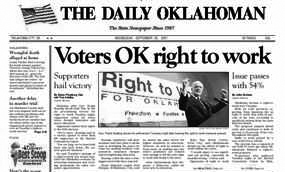Will Team Biden Weaponize Workers’ Pensions?
Big Labor abuse of worker pension and benefit funds as a means of advancing union bosses’ self-aggrandizing policy objectives is a familiar phenomenon.

Oklahoma Celebrates Right to Work Anniversary — Sooner Experience Reinforces Case For Federal Forced-Dues Repeal
(Source: October 2011 NRTWC Newsletter)
On September 25 a decade ago, one of Big Labor’s most formidable fear-and-loathing campaigns ever failed when Oklahoma approved a statewide ban on compulsory union dues and fees and thus became the nation’s 22nd Right to Work state.
Almost immediately, the very union bosses who had been shrilly predicting that a Sooner Right to Work law would swiftly lead to disaster moved to prevent the law from having any impact at all.
When the Right to Work law had been in effect just seven weeks, Big Labor lawyers launched an underhanded bid to overturn it. This legal attack kept the law’s future under a cloud for an extended period.
The state’s attorneys and Right to Work attorneys intervening on behalf of several independent-minded workers prevailed in 2003 when the Oklahoma Supreme Court unanimously rejected AFL-CIO union kingpins’ demand that it overturn the law.
Oklahoma’s Private-Sector Compensation Growth Has Far Outpaced U.S. Average
“Since Big Labor’s legal assault on Oklahomans’ Right to Work was thwarted, the state has had one of the strongest economies in the country, as measured by a number of key indicators,” said Greg Mourad, vice president of the National Right to Work Committee.
“For example, from 2003 to 2010, inflation-adjusted U.S. Commerce Department data show private-sector employer outlays for employee compensation, including wages, salaries, benefits and bonuses, grew by 12.2% in Oklahoma, after adjusting for inflation.
“Sooners’ real private-sector compensation expanded at a rate more than three-and-a-half times as great as the national average of 3.4%, and faster than in 41 other states.”
Oklahoma Also a Standout For Job Creation
“Private-sector employment is another major indicator that Oklahoma’s Right to Work law has helped boost economic growth, as proponents predicted it would,” Mr. Mourad continued.
“According to the U.S. Labor Department, from 2003 to 2010, private-sector employment in Oklahoma increased by 3.2%, even as it fell by 1.0% nationwide and inched up by an average of just 0.02% in Oklahoma’s forced-unionism neighbor states.”
The experience of Oklahoma is compelling.
But it simply reinforces what was already clear from the experiences of the 21 other states with similar laws prohibiting the firing of employees for refusal to pay dues or fees to an unwanted union: Right to Work measures make sense on economic as well as moral grounds.
This is true both at the state level and the federal level.
In fact, if Congress had never adopted the National Labor Act (NLRA) authorizing forced-dues exactions from private-sector employees across the country, states would never have needed to adopt Right to Work laws in the first place.
National Right to Work Act Wouldn’t Add a Word To Federal Labor Law
Fortunately, legislation now pending in Congress as H.R.2040 and S.504 would evenhandedly protect the freedom of private-sector employees nationwide to join or not join a union by eliminating all current federal labor-law provisions that authorize forced union membership, dues, or fees.
“The National Right to Work Act, sponsored in the House by Rep. Steve King [R-Iowa] and in the Senate by Sens. Jim DeMint [R-S.C.] and Rand Paul [R-Ky.], wouldn’t add a single word to federal labor law,” emphasized Mr. Mourad.
“It would simply strike out a handful of pro-forced unionism provisions in the NLRA and the Railway Labor Act that represent a gross violation of the individual employee’s freedom of choice.
“The record shows these provisions are also an economic albatross as our nation struggles to recover from the worst recession in decades.
“Americans deserve to know which of their politicians, federal as well as state, support the unjust, economically unviable forced-unionism system. For that reason alone, congressional leaders should let H.R.2040 and S.504 receive full House and Senate consideration.”

Big Labor abuse of worker pension and benefit funds as a means of advancing union bosses’ self-aggrandizing policy objectives is a familiar phenomenon.

Leaked CTU Proposals Won’t Do Anything to Improve Schools’ Poor Performance

What impact does handing a union monopoly power to deal with your employer on matters concerning your pay, benefits, and work rules have on your pay?